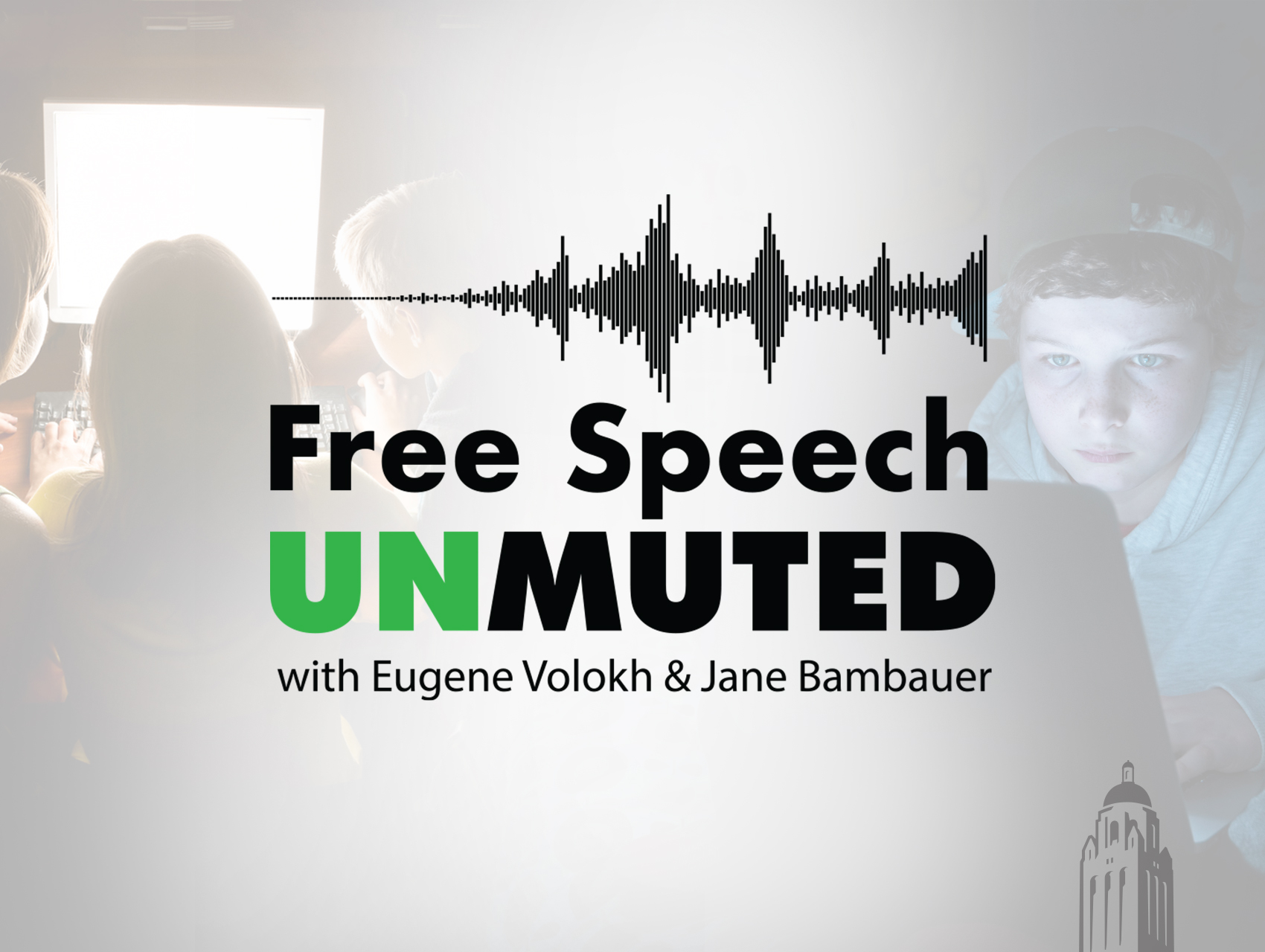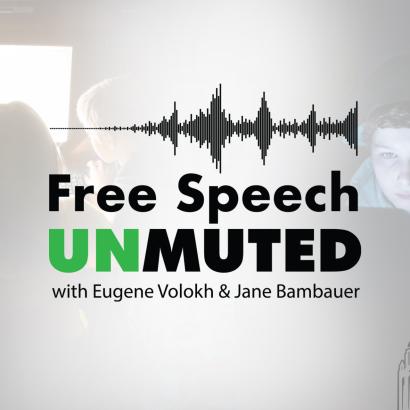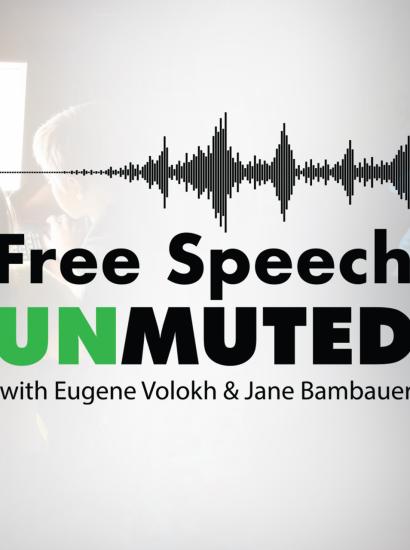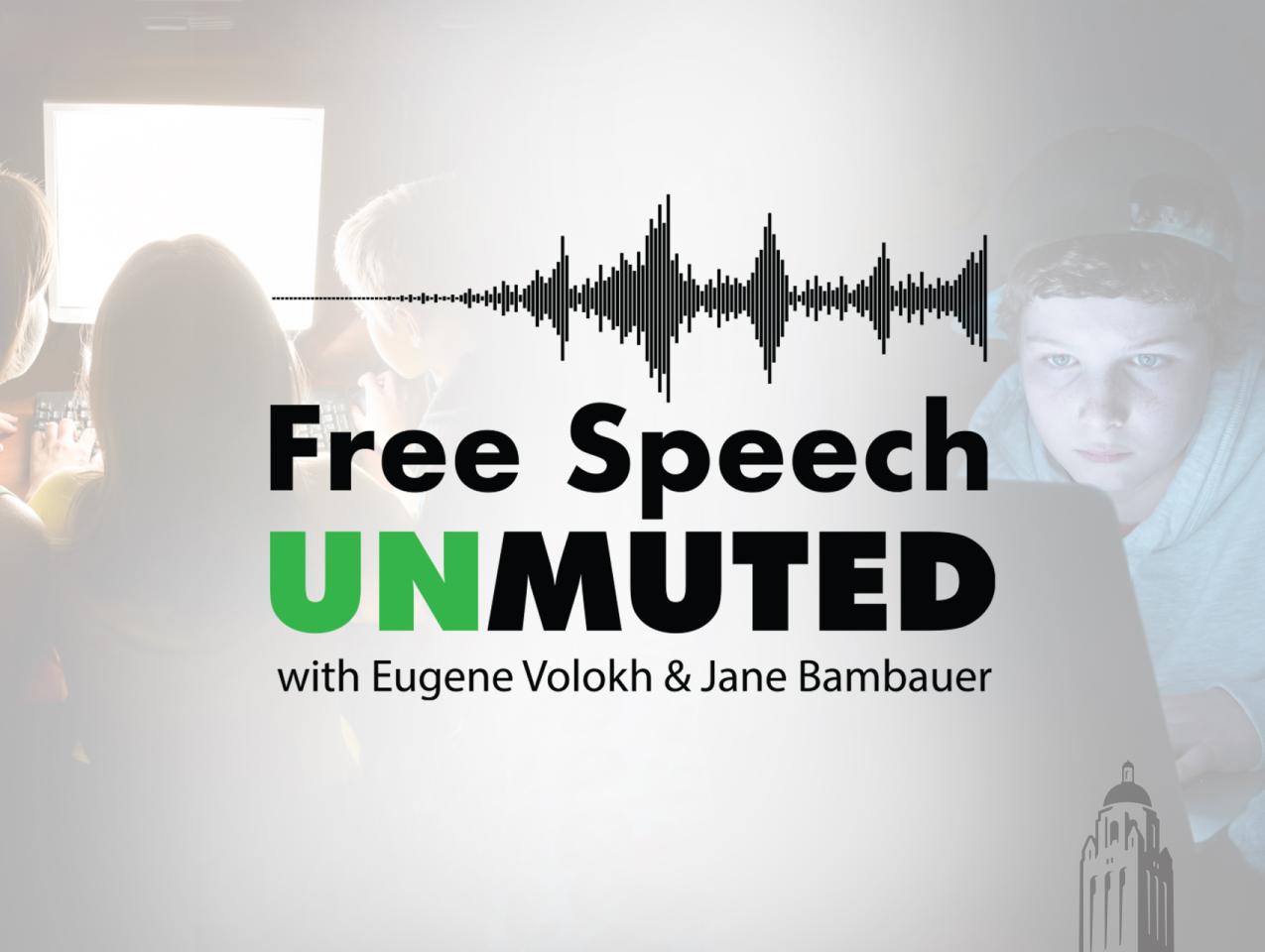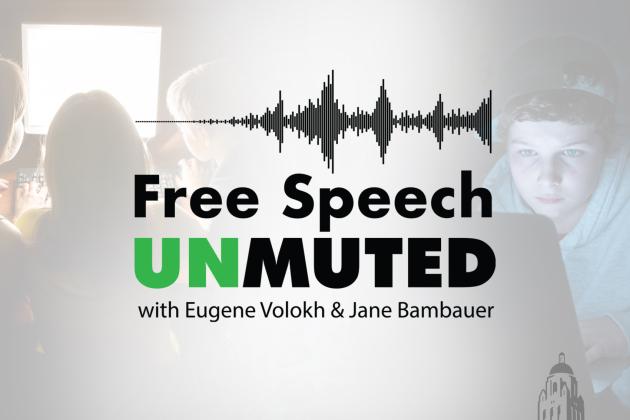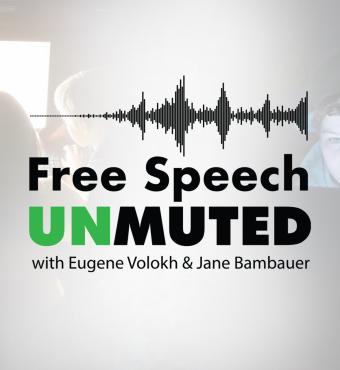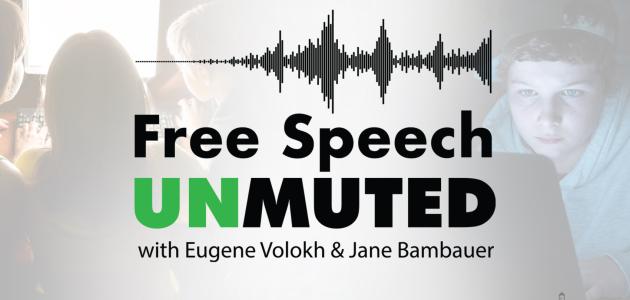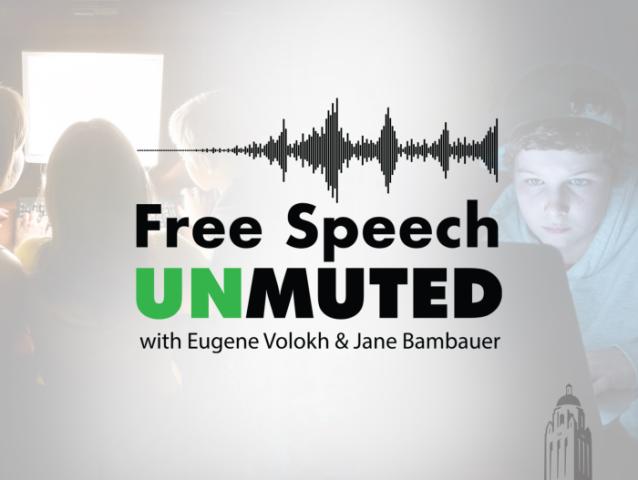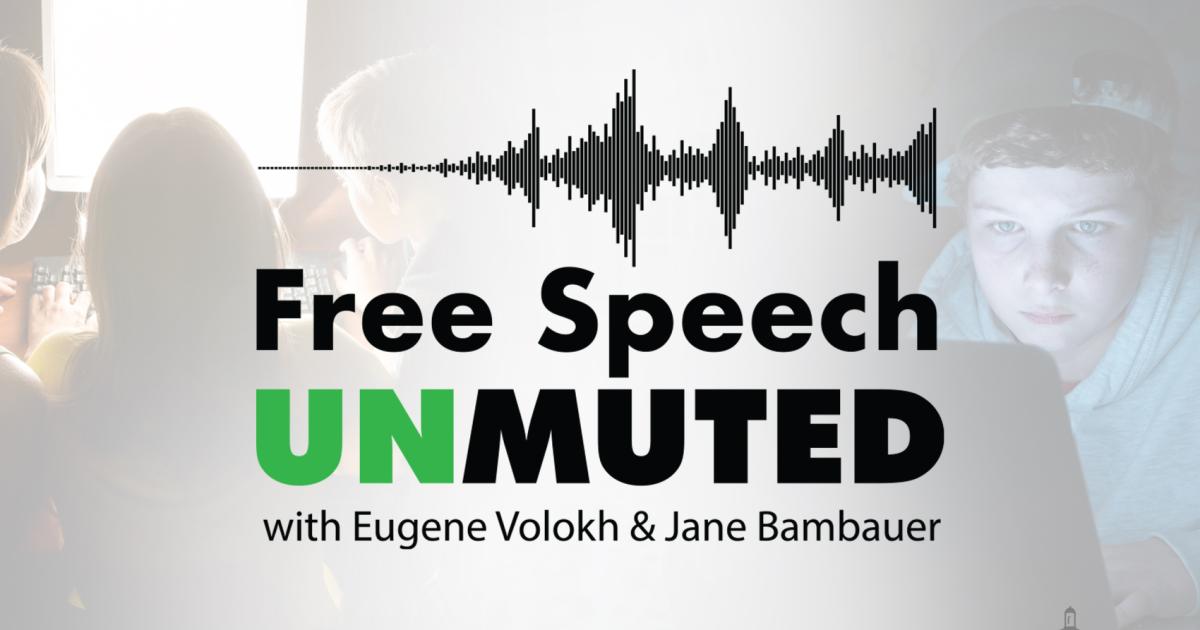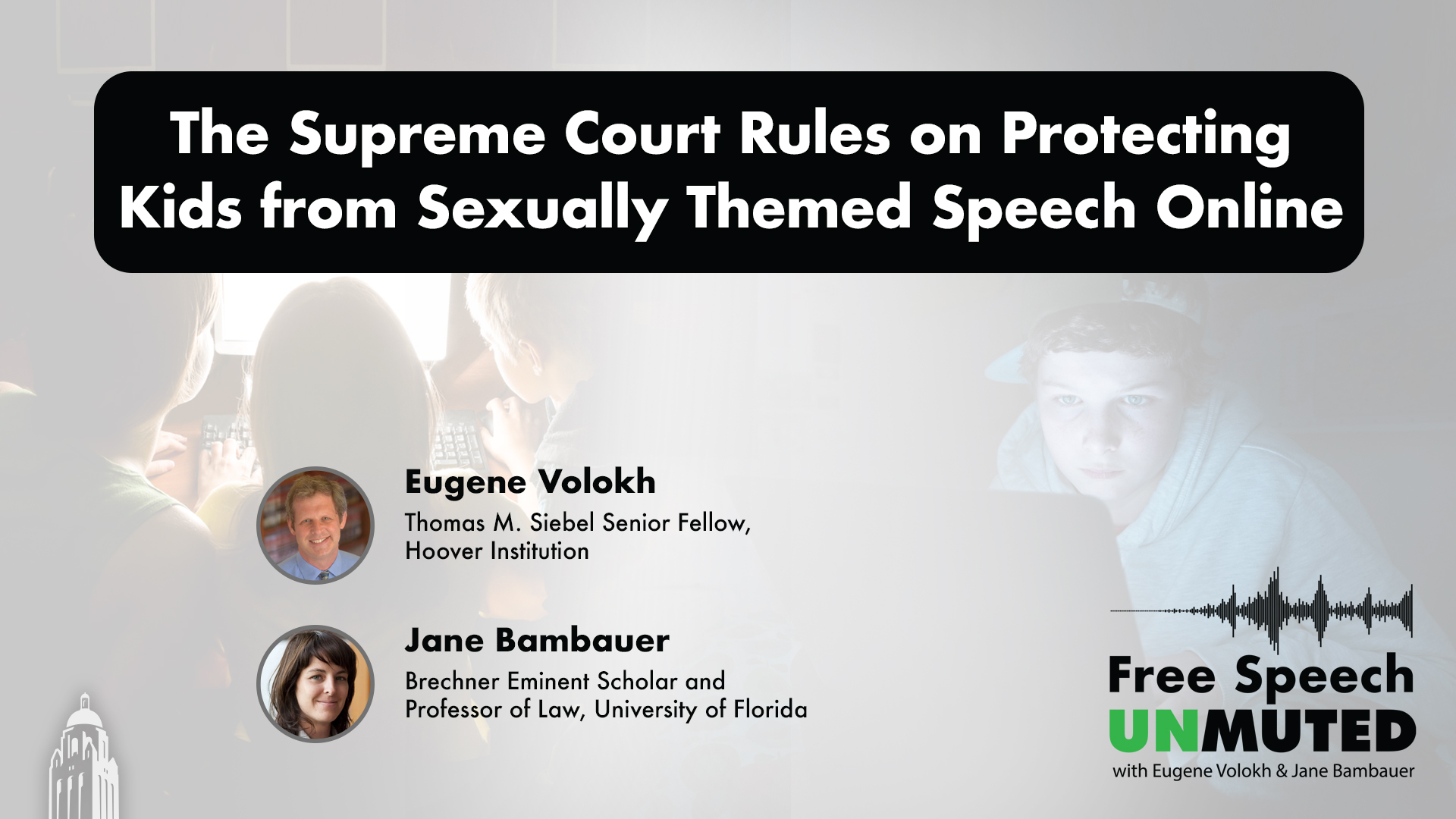- Law & Policy
- Judiciary
- Revitalizing American Institutions
Eugene Volokh and Jane Bambauer discuss the Court’s June 27 decision in Free Speech Coalition v. Paxton, which upheld a state law that required pornography sites to “use reasonable age verification methods ... to verify” that their users are adults.
Recorded on July 1, 2025.
WATCH THE EPISODE
>> Eugene Volokh: Hello,and welcome to Free Speech Unmuted. We are my co-host, Jane Bambauer at the University of Florida, and me, Eugene Volokh. I'm at the Hoover Institution at Stanford and Emeritus at UCLA Law School. We're talking today about the very recent decision just from last Friday in Free Speech Coalition versus Paxton.
Which is about pornography and in particular whether a state may have a law that requires essentially age screening for porn sites to make sure that the sites are only, well, shouldn't say make sure. Nothing is sure in life. But to make it more likely that the sites are only available to adults and not minors.
By a 6:3 vote, the Supreme Court upheld the statute. We talked about this some months ago when it was just pending, now we're back and we can tell you what the law now is, whatever we think it maybe should have been, whatever it looked like it would be back then.
Well, we can tell you what it now is, at least for now. That's what we're going to be discussing. Jane, you want to set the stage for us?
>> Jane Bambauer: Sure, yeah, so before this case, the Supreme Court had heard, just to recap what we had said last time, the Supreme Court had heard a few kind of relevant cases.
One of them, Ginsburg versus New York, was about age verification in the brick and mortar context. That was a state law that criminalized or banned the knowing sale of pornography to minors. And so that got upheld and kind of, and kind of, you know, sort of supplied the, even the category of obscenity with respect to minors.
So we know we have this only, you know, you know, this unprotected or semi protected, I guess, unprotected range of material that is unprotected vis a vis minors, but protected vis a vis adults. And then we had the cases, the Internet era cases that we discussed last time.
We where the laws, the federal laws in those cases kind of put an imposition on Internet service providers to either not, well, either to not post pornographic material or to not provide it. But there were defenses for reasonable attempts to screen it out. I'm kind of glazing over the details a bit, but in those cases the Supreme Court struck down the laws and, and they never really dealt with Ginsburg, though.
They never sort of, they did not explicitly cite or name, you know, name check Ginsburg and didn't explain how the brick and mortar rule and, and sort of practice of asking for ID could be so different from the Internet practice of sort of free for all. By the way, the last time we talked about this, I boldly and confidently predicted that the Supreme Court would strike down this Texas law.
I thought that the analogies to the Internet era cases were just too strong. You helped convince me in our conversation that the tailoring analysis under whatever level of scrutiny might be applied would be hard for the government to achieve, in part because I was not even thinking about the foreign websites that, you know, would be available to kids.
And yet, nevertheless, the majority of the justices, with Justice Thomas writing, decided no, that this law does survive. They applied intermediate scrutiny for reasons that I think we'll get into, because I think this is even just that part of the analysis is interesting. And then they found that it survives intermediate scrutiny.
And Justice Kagan, along with, I think the two other liberal justices, I think it was just three. Right, signing onto it, dissented. So this had a conservative versus liberal split, if you are paying attention to those types of things, with the conservatives all agreeing that the Internet can be regulated more, it seems, if the purpose at least is to enforce, effectively enforce, restrictions on minors accessing porn.
Okay, so where should we go from there? What, Eugene?
>> Eugene Volokh: Well, so thank you very much for, for that summary that those were those were the issues, in a sense. Those are the arguments, let's just lay out what what the court said. We can then critique whether and argue whether it was right or wrong, I often find, especially as I get older and older and do more and more lawyering as well as academic work is.
I'm not terribly interested in arguing whether a Supreme Court got it wrong on something. If it got it wrong, it's still the law. What I'm more interested in is in seeing kind of what the implications of it are for other cases going forward. So we'll talk some about that as well.
So first, let's focus on the majority opinion, because that is what sets forth the law. So here is I oversimplify, but here's what I think is the heart of the majority opinion. So the majority this opinion, Justice Thomas, for the six, let's call them conservative justices, because they basically are.
He says, look, we have this category of speech that is constitutionally protected for adults, but not protected for minors. It's not obscene under the First Amendment test that if it were obscene, then it could could be restricted for adults, although as a practical matter. Obscenity law is rarely enforced with regard to adults, but it is obscene as to minors, and it should, and it therefore could be prohibited.
Distributing it to minors could be prohibited. And he says, look, this is a familiar sort of situation in other areas of the law. Obviously, it's true for alcohol and tobacco and other such things for driving, where adults can do it, minors with different age cutoffs can't. And of course, you may need to check people's ID before you sell alcohol.
Of course, somebody might say, well, but there's no constitutional right to get alcohol. Maybe it's different when there's a constitutional right involved. And he says, well, but if you look at other situations where there's a constitutional right, you also have a. Excuse me, if you look at other situations where there's a constitutional right for adults but not minors, there's also age screening.
One example he gives is with regard to getting a handgun license, or that's in Texas, or you could imagine having a background check for buying a gun, whether a handgun or a long gun. There's a second amendment right for adults, not for minors. How do you determine who's an adult, who's a minor?
Well, you have to check. And if that means that, that there is a reduction in convenience and in privacy for the, for the adult who is exercising that right, well, okay, that's a price, but it's a price that you may have to pay. Gives another example the right to register to vote.
Again, something that adults have, not minors check people's age or to marry. Is another example that he gives. So he says, look, as a general matter, if there is a constitutionally permissible restriction on minors, including on minors, access to what for adults would be a constitutional right that carries with it by kind of necessary implication, the power of the government to check whether the person is an adult or is a minor.
That power again will cause some inconvenience and possibly some loss of privacy to the adults. But that's the price that has to be paid for enforcing the legitimate rules, the rules that have already been upheld prohibiting that behavior by minors or with respect to minors. Okay, so that's the first kind of big picture principle.
How does it fit into the structure of First Amendment law? Well, here is where there's a really innovative, and you can judge whether that's good or bad innovative solution on the part of the majority that the dissent much disapproves. So the majority says, look, we generally speaking have a rule that content based restrictions on speech are subject to strict scrutiny and content neutral restrictions are subject to intermediate scrutiny, which is more government friendly.
And that's true generally, but that's something of an oversimplification indeed when it comes to restrictions on speech that is constitutionally unprotected, full on obscenity, or maybe true threats or child pornography, there's no heightened scrutiny at that point at all. Once the exception is found to be present here, there's something in between here.
Here there's a restriction that's justified in a sense by the content of the speech, but it's justified by the desire on the part of the government to deny access to the speech to minors for whom the speech is constitutionally unprotected. So it's something a bit in between. It's not a full on restriction on unprotected speech because the speech is protected for adults, but it's not a full on restriction for unprotected speech because it's unprotected for minors.
Rather, because it is aimed at enforcing this adult minor distinction, a closely fitted restriction on access by minors which basically requires some sort of electronic carding is subject only to intermediate scrutiny. Now the dissent very much disagrees. They say no, no, makes no sense to come up with this weird intermediate solution.
The question is, is it content based? Of course it's content based. The government is worried that speech with a certain content, highly sexually themed speech, is going to be bad for minors. We have a well established category. We've got precedents like Ashcraft, the ACLU 2, that deal with that.
They say it's content based subject to strict scrutiny. It's got to be narrowly tailored to compelling government interest. That's a hard test for the government to meet, but not impossible. If the government shows that this is really necessary and really well tailored, not over, not under inclusive. If it's the least restrictive alternative, then it might be upheld.
But that's the test that should be applied, not the more relaxed intermediate scrutiny. Interestingly here is part of Justice Thomas the majority's response. They say, well, we actually think that strict scrutiny should be an extraordinarily demanding test, very, very high. It's the most demanding test known to constitutional law.
They say that the Court had only once held that a law triggered but satisfied strict scrutiny when it comes to content based speech restriction and that involved unusual application involving deference to executives evaluation of the facts in the context of national security and foreign affairs. That was the statute prohibiting certain kinds support for foreign terrorist organizations.
So the majority says strict scrutiny should be a very hard test, very strong protection for free speech. But as a result it shouldn't apply quite as broadly as the dissent argues. It should be applied somewhat more narrowly still to a very large range of speech, but not including these kinds of restrictions on obscenist minors, a speech where the government is trying to implement age verification.
And the dissent says no, the test strict scrutiny should be applied more broadly, but perhaps should be a little less strong. Both sides are actually saying we are the true speech protectors. The dissent says, look, in this very case we're protecting speech more by applying strict scrutiny more broadly though recognizing that it isn't always going to be fatal.
Whereas, the majority says actually we're protecting speech more to be sure in this particular case that the speech restriction is going to be upheld. But by doing that, by applying a different test to this quite unusual category of speech that is protected for adults but not for minors, by applying this more relaxed test there, we're saving the strength of strict scrutiny so it can be really, really strong in the zone where it applies.
As a First Amendment lawyer, I can tell you I'm going to be quoting that passage from the majority quite a lot. The one that says strict scrutiny is the most demanding test known to constitutional law, almost never satisfied. In any event, I may agree or disagree with with the courts holding in this particular case.
But going forward, in future cases when I'm arguing in favor of the unconstitutionality, in favor of striking down content based restrictions under strict scrutiny, the other side will say, well, this is the rare case where which passes strict scrutiny, whatever hypothetical future case. I'm litigating, I'm gonna say no.
It would take an extraordinarily rare case to pass strict scrutiny, and this isn't one of them. So that's kind of how the case, I think, is likely to play out for the future. There's a lot more to be said about it. But, Jane, what do you think?
>> Jane Bambauer: Okay, yeah.
So yeah, I'm nervous maybe for some of the reasons Justice Kazan are maybe for some slightly different reasons. So first of all, I do think that one thing this case does is either clarify or change course a bit from the Reid vs. Town of Gilbert decision. I might characterize it as clarifying it.
So when Reid was the case where the Supreme Court, when analyzing a sign code, a local ordinance that dealt with what types of signs can be posted publicly and what kinds can't, they said, look, it's making these distinctions on the basis of content. A content based restriction is a content based restriction.
We mean it, we really mean it. There are no exceptions. And at the time I remember, even though that was a unanimous opinion, a lot of commentary said what they can't actually mean that. There are just too many sort of pragmatic reasons to need something less strict, even though you're identifying the type of, you know, problem speech or whatever by its content.
So now with this case, I think we can see that, you know, there is some pragmatism, I suppose. That's one way of looking at this, is that, well, when on the face of the law, you know, the Texas law does say, okay, this applies to basically, websites that are one third pornographic.
Well, that's based on content, right? But it's, it's applying it is identifying that content in order to then target a subset of unprotected access or uses of that speech. The Court is saying, okay, we're not gonna apply the strict scrutiny. So I think this particular case can help explain why, for example, regulations of commercial speech probably survive read.
Because you could make sort of similar analogies how, as a matter of pragmatism and trying to, you know, the law is really just trying to identify a set of speech that is lesser protected and that sort of thing. So, okay.
>> Eugene Volokh: Can I just chime in for a moment there, because I want to agree with you and just elaborate a little bit on this.
So first of all, indeed, in the commercial speech context, I think this is what you were alluding to, but I wanted to make it more explicit. The Court has adopted a somewhat intermediate standard. Calling it intermediate scrutiny is a little misleading because intermediate scrutiny means somewhat different things in different contexts.
But it has at times called intermediate scrutiny. And one of the rationales was that we don't want to say, commercial speech is fully protected. And then given that we know there are going to be all sorts of restrictions on, for example, misleading commercial speech and various other such things, then have that dilute the protection offered to other speech.
That if you're aware that some category of speech is going to be more restricted because you acknowledge that it's important to be able to protect consumers from being misled, then you should acknowledge that by imposing a lower standard. The other thing, and I think you're quite right about the way that the Court deals with such things, often when you mention Reid, is you might look back case from 1972 by Justice Marshall, Police Department of Chicago versus Mosley.
And it struck down an ordinance that limited picketing but had an exception for labor picketing. And the Court said that's unconstitutional because of that exception. And what did Justice Marshall say? Above all else, the First Amendment means that government has no power to restrict expression because of its message, its ideas itself, its subject matter, or its content.
No power. Well, that's an overstatement, right? We knew even then that it has the power to restrict true threats of illegal conduct. It has the power to restrict a narrow category of incitement to imminent illegal Conduct it very shortly after said there is an exception for obscenity. So that was something of an overstatement, but that is often the way that law operates.
Law is not, is not math, where if you've got a theorem, presumably that theorem is, is true in all instances. And if there are limitations, well, it's only true for positive numbers. Well, then you've got to include that right then and there in the theorem. Otherwise, your proof is invalid.
It's not the way the law works. The law often makes these broad statements, but then says, well, that was true in general, but there are some exceptions. So I do think Justice Thomas, who wrote Read v. Town of Gilbert, I think, would say, yes, indeed, Read v town of Gil, says content based restrictions are unconstitutional.
We've always recognized there are some exceptions to that, various First Amendment exceptions, such as obscenity itself. What we're recognizing here is there's one kind of exception to that. Excuse me, not just content based restrictions are unconstitutional. They're subject to strict scrutiny.
>> Jane Bambauer: Strict scrutiny,yeah I got it.
>> Eugene Volokh: One exception to that is that when you've got this speech that is close to an exception, or not even close, but that is within an exception.
When it comes to minors, though, outside the exception, when it comes to adults, well, then there too you don't fully apply strict scrutiny. So I think he would say this is just the way that law often works. We make a general statement recognizing that in certain situations there may be either well established exceptions to that statement or ones that we, we might, we might recognize in years to come.
That's what we're doing here.
>> Jane Bambauer: Yeah, I mean, another way to put it is like, if it made any sense, the law could say, you must confirm the age, using ID or, or credit card or whatever of only minors who are trying to access pornography. But then how would you do that?
Other than by knowing or maybe another example would be, you may not ask if a woman is pregnant during a job interview if you might use that information to make a decision on the candidate. Well, that's I mean, maybe this is slightly different, but there it would be extremely difficult, maybe even impossible to distinguish between the case where you're just asking out of pure curiosity and the one where you're going to use that information for discriminatory purposes.
So, I think, okay, fine. In order to make use of the limitations that the government has the liberty to restrict or to regulate, they have to bleed over a little bit into the protected system speech area. Now what makes me nervous though, is that I see a lot in the reasoning that looks like the secondary effects tests from the zoning law cases.
Zoning cases. So those were the cases we discussed this last time. We talked about pornography as well, or sexually explicit expression of all sorts. These were the cases where the Supreme Court looked at zoning ordinances that sort of required all adults themed live entertainment to be in one part of town.
And the idea was, well, yes, this is a restriction based on expression, but it's in service of this other. This other unpro this other goal that is unrelated to speech and that is serving, the secondary effects. That is serving society in some other way. And Eugene, I think both you and I have been a bit critical of this because the only way to serve that secondary goal, of course, is by making assumptions about who is going to be attracted to the expression in the first place and that sort of thing.
So the reasoning in this case looks to me a lot like that. Okay, yes, it's true that on the face of this statute, it is in fact requiring any website that has pornography to impose a burden on every user, even if the vast majority of those users are adults.
But we're going to kind of ignore that because it's in service of trying to enforce this regulatory priority that is that well, unprotected. I was going to say unrelated to speech. It's unrelated to protected speech. So I see in this the kernels of a Supreme Court that could, if it wanted to.
To start expanding the secondary effects doctrine. I'm thinking about how this case will affect things like the age verification rules for social media. Social media is protected speech. But if the idea is, we're protecting the youth from some known mental health crisis, is there some logic that might help extend this case all the way to that type of application?
I see some, I see.
>> Eugene Volokh: Right, well, there's always reason for concern in anything the court or anybody else does. But in particular, I totally appreciate your point that by relaxing in some measure the requirement that content based restrictions be subject to strict scrutiny. Never all a universal requirement, but used to look like it was broader, now it's a little narrower, the court may be opening the door to further narrowing of the zone where strict scrutiny applies.
I do think it's important that this particular precedent is so focused on the fact that there is a recognized substantive exception for speech aimed at minors. Right now, there is no such exception for social media.
>> Jane Bambauer: Social media aimed at a minority-
>> Eugene Volokh: In fact, we know from Brown v Entertainment Merchants association case from, well, going on 15 years ago now, we know that the, there's not even a first amount exception for say, violent material.
Material depicting violence that's shown to- And respected minors, exactly, yeah, right.
>> Jane Bambauer: Yeah, the way there's an obscenity to minors exception. There is no violence to minors exception.
>> Eugene Volokh: Right, right, even when it's video games, which you might have thought that the court would have said, well, that's not really valuable speech.
No, the court says it's fully protected speech, including when distributed to minors. That law was limited to restricting distribution to minors. The court still struck it down. So let's say that there is a restriction on, on minors accessing social media. Let's take the crispest example. Just minors under age 16 cannot access social media.
Let's imagine such a law. And therefore social media platforms have to check the age of all their users. Well then the first question that the court is going to have to ask is, is that a substantively valid restriction as to minors? And it might say no, because minors have the right to access social media, just like the right to access violent video games.
Let's say, it says yes, though. Let's say, it says yes because there's compelling interest in protecting minors from social media. And we think that social media is very dangerous to minors. Or maybe just because we think miners rights, after all, are less, less worthy of protection because they're not sufficiently developed to in a thoughtful way, choose what to consume and what not to consume.
So let's say it says, yes, the restriction on minors access is permissible. Well, yes, then there would be also permissible restriction on adults, that is to say age checking for adults, even though that may interfere with privacy, may interfere when some with adults convenience in order to enforce this restriction on minors.
And I think there, Justice Thomas would say, look, if we, we would have by then already said there is an exception for minors access to social media, then yeah, it makes sense that in order to enforce that exception, we should be able to edge check users to see if they're minors or not.
But that would be the first step. This decision, I don't think could be used to uphold a law that age checks access for things where minors have every right to access it. Because then there's not the justification that the court pointed to of having to enforce the adults minors line.
>> Jane Bambauer: Right, there isn't the Ginsburg.
>> Eugene Volokh: There is a First Amendment adults minors line.
>> Jane Bambauer: Yeah, yeah, that's probably right. The other thing I wanted to raise about the, the majority opinion before we move on is that Justice Thomas does this thing that Justice Kagan later calls him out on where he suggests that because laws that require retailers to ID everyone before buying porn have never been challenged.
So these are laws that are somewhat distinct from the one in Ginsburg, because in Ginsburg you had to knowingly sell pornography. But so Justice Thomas said that because all of the brick and mortar laws since Ginsburg have not been challenged and since ACLU vs Reno haven't been challenged.
That kind of abeyance suggests that there's kind of a constitutional doctrine in sort of like almost like a crowdsourced understanding of the constitutional, of the constitutionality of those types of regulations. I thought that was interesting. It's something that I've always descriptively thought is true of courts, but I've never seen a court actually say so that the prosecutors and the lawyers who could have brought not prosecutors, but I guess the lawyers, the Tibetan's attorneys who could have brought challenges didn't.
And so therefore there's this, you know, popular understanding that there's not a First Amendment problem and the court should be aware of that. That I found odd and fascinating.
>> Eugene Volokh: Well, so I have a somewhat different view of, of Ginsburg and I think the majority shares my view there.
It' Ginsburg did not say you have to check ID the loin. Excuse me, the law in Ginsburg, the law held in Ginsburg didn't say you have to check id. The law, however, prohibited distribution of material to minors. And while it said, excuse me, that is to say obscene is to minors, material to minors.
And while it said knowingly, it actually made clear that what that really meant was that you. Well, actually, I'm sorry, let me restart the sentence. While it said knowingly, what it made clear is that you'd only have a defense if you made a reasonable, bona fide attempt to ascertain the true age of the minority, at least if the person looks like they're on the borderline.
So as a practical matter, the law in Ginsburg did require carding, at least for people who looked like they might look young, because if you didn't card them. And you said, I didn't know he was 16. You said, well, did you make a reasonable effort to ascertain the true age?
No, well, then in that case, we're essentially going to treat you as.
>> Jane Bambauer: Constructive knowledge.
>> Eugene Volokh: Law sometimes calls constructive knowledge. It means not knowledge, but something that the law treats as that. So really, in many ways, it was a law requiring ID check. And here's another thing.
The decision didn't talk about this, but imagine somebody shows up at a pornographic bookstore wearing a. Ski mask or, or a face mask that just obscures his face and wants to. Wants to buy pornography. Presumably at that point, the, the clerk needs to say, can you lift that mask?
I want to see if you, if you're an adult, you lift the mask and you look like you're 60. Well, okay, fine, not a problem. But if you lift that mask and you look like you're 16, maybe, or 18, we don't know. Well, then I'm gonna have to card you.
Absent that, again, the clerk wouldn't be making a reasonable bona fide attempt to ascertain the true age of such minor. So in any event, I do think that the law upheld in Ginsburg basically was an age checking law. It's true that there's been very little litigation about the specific details of constitutionality of such laws since then.
And I think the majority is saying, look, in light of Ginsburg, the reason we haven't had to revisit the issue since then is basically everybody fell into line. Everybody realized, okay, so not that it was uncertain.
>> Jane Bambauer: Right, they fell into line because they saw it the way the court saw it as already having been covered by Ginsburg.
>> Eugene Volokh: I think that's right, I think that's right.
>> Jane Bambauer: Even after Reno. I guess I was thinking that the, that the opinion was acknowledging that even if the dissent thinks that, especially in light of Reno and other cases since then, there might be room to challenge the retail age checking requirements.
Even if that were so, we could look at the fact that they, in fact, have not been challenged. And the way he puts it, I thought this. Yeah, the way he puts it is the fact that those non challenges would embody a constitutional judgment made by generations of legislators and by the American people as a whole.
But I hear what you're saying. It's really more like they're following precedent, not so much that they're making their own precedent.
>> Eugene Volokh: Yeah, I think that's right. So I think the key line that explains the majority's view of Ginsburg, and I think correctly, is the New York statute upheld in Ginsburg required age verification.
It permitted a seller who sold sexual material to a minor to raise honest mistake as to age as an affirmative defense, but only if the seller had made a reasonable bona fide attempt to ascertain the true age of the minor. So the court says that's basically age verification.
Even if it doesn't say we require age verification. That is what in practice it requires, and since then, it's Been understood that that is the way the way things work, at least in brick and mortar situations, yeah. So Jane, I want to make sure we talk about both the dissent, but more broadly the point which the majority acknowledges, just thinks it isn't enough to carry the day.
But I think we need to lay it out about the nature of the burden on adults because the majority acknowledges this is not free for adults. This is not something like, well, it only burdens minors and not adults. So let's talk about that because I do think this is a serious issue.
>> Jane Bambauer: Sure.
>> Eugene Volokh: You want to take it away?
>> Jane Bambauer: Yeah, so I mean this is going to require, I mean first of all a website to, to, to figure out whether they're in the view, in within the scope of the stature. But then assuming that that is easy enough, it will require everyone who visits the site to enter their details, either an ID or credit card.
We talked about this a little bit last time we discussed the case as it was pending. That is a burden not only in terms of the nuisance, but also the privacy, the potential privacy costs to the adults. It's likely to chill at least some adults from accessing the websites at all as a result of both the nuisance and the privacy.
And it could be a fairly serious privacy imposition to the extent that data held by any company could be spilled or accessed or used for blackmail or whatnot. Let's see, was there other commentary on the burden that I am leaving out?
>> Eugene Volokh: Well, no, no. I just think it's really important to identify and there's been some debate about how much of an interference with privacy this would be.
There's also of course the concern about possible cost for the site to do this verification. Not vast on an incident by incident basis, but may add up. The other thing though, you mentioned this about the possible under inclusiveness of the law. Not so much a problem under the majority's test because if the law is content neutral, it doesn't have to be as perfectly tailored.
But the dissent would apply strict scrutiny and there is a concern about under inclusiveness. Lay it out for us because again, I think it's important that the audience understands.
>> Jane Bambauer: Even under intermediate scrutiny, there is a tailoring esque aspect to it that I think arguably wouldn't be met here.
So part of the, the part of the problem is that there are alternatives such as filtering that that could be used, maybe even used more effectively. So again, I don't remember even the dissent talking about foreign based porn. Did I miss it or they-
>> Eugene Volokh: They didn't talk about it, but I think we should talk about it.
>> Jane Bambauer: We should talk about it, yeah.
>> Eugene Volokh: It's important that everybody just understand what the limits of these laws are. Even some of these laws should be aware that you may be in Texas and as a parent and you may have kids who you think are being protected by the laws, but maybe they're not.
>> Jane Bambauer: Yeah, maybe they're not. And so it's possible that device based filtering, even though that's imperfect too because you don't know if your kid is using someone else's device or whatever. Although that's imperfect, that type of filtering that happens at the end of the, you know, at the end of the network might actually be more effective at filtering out porn than this, this legislation could really get at.
>> Eugene Volokh: Right in part because there's all of this foreign porn that's in countries where the writ of the United States government does not run. And unless we start coming up with a great firewall like with China to try to block all of this, all of this access to foreign sites, it could just be that a lot of the porn will move offshore.
>> Jane Bambauer: So I also, yes, a lot of it is. And then also just as Kagan mentions some social media and other large platforms have pornography on them. Just they don't meet the 25% threshold or whatnot or one third threshold. The end and by the way, Google and other search engines are explicitly, explicitly exempted.
So there's going to be other ways to access porn. I'm just imagining pornhub buys a social media company so that it can be like one, you know, it can triple its size so that it doesn't have to comply with the law. It's unlikely to happen. But, it could.
>> Eugene Volokh: I will say there is a platform that, that at least when I last checked, had a lot of porn. That's Twitter slash X, maybe that's why they called it X.
>> Jane Bambauer: There's going to be a lot more X on it now maybe.
>> Eugene Volokh: Unlike Facebook, it does not generally forbid porn, but it actually does try to.
>> Jane Bambauer: Downgrade it.
>> Eugene Volokh: Segregated is not quite the right term because it's not physically segregated, but tries to block it for people who aren't willing to get. So people don't accidentally, I think, run into porn there. And I believe that involves some degree of age checking. So it's true, social media platforms are not covered, but most American social media platforms.
If they are at least two-third non porn, they have various business reasons why they might want to implement age verification in any event. And this by the way, again is the difference between strict scrutiny and intermediate scrutiny. The majority does say intermediate scrutiny is deliberately leaves states some more latitude to say we're gonna try to deal with this problem one step at a time.
And there's certain countervailing concerns that lead us not to try to restrict things quite as much. We may create some exceptions so long as they're not viewpoint based or unduly content based exceptions, that's okay. Whereas, if it's strict scrutiny, then that might not be okay. Another reason the majority says while it's actually good in these kinds of situations, relatively narrow situations to apply intermediate scrutiny rather than strict scrutiny if you're.
>> Jane Bambauer: If gonna strike down the law, yeah. Or rather if you're gonna uphold the law, rather. I also wanted to, also forgot to, I wanted to comment on the privacy burden that I think Justice Thomas's opinion said something interesting about as well. He said, and I think this is right that this is a context where the user and the entity collecting the information have a mutual interest in protecting privacy.
>> Eugene Volokh: Right.
>> Jane Bambauer: And so it might make sense that the government can make assumptions about the likelihood of selling or in some way humiliating the user base. The other thing is that since Ginsburg, at least, maybe even since Reno, pornography use is a lot less stigmatized, and so that too may affect the privacy burden.
So I think even on that part of the tailoring analysis, or rather on that part of the scrutiny analysis, the burdens may not be as great as they once were.
>> Eugene Volokh: Maybe, I think that there is a very serious privacy burden here. At the same time, people access porn even when they need to provide credit cards and such.
Not everybody, but some, many do. So I do think it'll probably chill some people from accessing porn sites in those states, some adults, even if it's porn that's constitutionally protected for adults. But it's true that we can't overstate. We shouldn't overstate the magnitude of the children, we shouldn't say, well, of course nobody will access porn.
>> Jane Bambauer: That will never happen.
>> Eugene Volokh: Nobody will access porn is never the right prediction. It is the irrepressible form of speech.
>> Jane Bambauer: Every new speech technology, first it's a novelty, then it's porn and then everyone else uses it so.
>> Eugene Volokh: Right.
>> Jane Bambauer: Well, all right, anything else you want to add?
>> Eugene Volokh: Well, I think that covers it for now. I'm sure there'll be further developments in a lot of these areas. I doubt there'll be a lot of follow on porn age gating litigation just because I do think this resolves the issues fairly well. But Jane, you are quite right to identify kind of the coming, the already existing wave.
But presumably the coming appellate cases and eventually probably Supreme Court cases dealing with restrictions on minors' access to social media. And those are going to raise some interesting and difficult questions. We'll probably have some more to say on this in future episodes.
>> Jane Bambauer: I think so.
>> Eugene Volokh: So great talking to you as always, Jane folks in the audience, great talking to you folks as always in a different sense of talking to.
>> Jane Bambauer: Although you can submit questions.
>> Eugene Volokh: You can submit questions. Scott, can you remind me please what the email address is or the location is?
>> Eugene Volokh: Hoover.org/skfsu, so folks in the audience, great pleasure talking to you folks as well. It's a different sense of talking to than with Jane, but it doesn't have to be that different.
You folks can ask us questions. Just go to hoover.orgaskfsu that's for free speech unmuted. Not Florida State University. Jane's at the University of Florida. Not Florida State University, but hoover.org/askfsu and we'd love to see your questions. Until next time, all the best.
>> Speaker 3: This podcast is a production of the Hoover Institution, where we advance ideas that define a free society and improve the human condition.
For more information about our work or to listen to more of our podcasts or watch our videos, please visit hoover.org.







